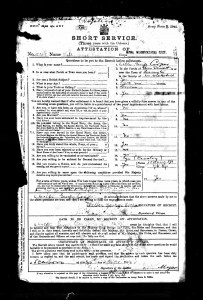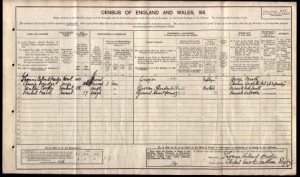On Thursday it was apparent that a crisis had been reached. Banbury market reflected the condition. Farmers asked for an increase of 5s. for their wheat, and buyers were nervous. As a result but little business was done and no sales were reported officially with the result that the Inspector of Corn Returns has been unable to issue an official average. The other local corn markets of the weekend showed similar conditions and local markets may be said to have been paralysed.
At all the places of worship on Sunday prayers for peace were offered and in many places special reference was made to the crisis. At the Grimsbury Brotherhood a resolution was passed recording the desire of the members to strengthen the strenuous efforts that England was making to limit the area of conflict, maintaining their own peaceful relations with the nations of Europe and preserving their freedom to act for peace as opportunity offered.
Increasing interest was placed in the special telegrams posted at the Banbury Guardian Office. On Sunday and Monday they were awaited and read with anxious interest, especially Sir Edward Grey’s statement in the House of Commons on Monday, while each day since our office has seldom been for more than a short time without a crowd of people anxious for the latest information.
On Monday at midday, the Territorials returned from the camp at Marlow, whither they had gone the previous day with instructions to await mobilisation orders. The Order in Council calling out the Army Reserve and embodying the Territorial Force was issued during Tuesday and the copy posted at the Town Hall became another centre of interest.
The streets on Tuesday presented an exceedingly animated appearance. All day a crowd occupied the streets shopping or awaiting the latest news and distributing it. The ordinary householder had awakened during the weekend to the possibilities of the conflict as regards food supply and there was a general rush to lay in stores. A few prudent housekeepers had, in the latter days of last week, stocked an increase of necessities, but on Tuesday there came a greatly enhanced demand both here and in the country generally.
On Tuesday the provisions were obtained at only slightly increased prices, but by last evening (Wednesday) very many of the articles had, owing to the general demand, increased considerably. People have been buying absurdly and laying in stores for months ahead in some cases, with the result that they have exhausted the stocks and forced up the prices. It seemed the general opinion that a fall would accompany the repletion of stocks and a saner feeling among purchasers.
Yesterday morning the town awoke to the realisation of the most serious development, viz. the declaration of war by Britain against Germany. The local squadron of Yeomanry concentrated in the town at an early hour, and the two companies of the 4th Oxfordshire and Buckinghamshire Light Infantry paraded at the Drill Hall. A large crowd collected to see them depart for Oxford, which they did at about eleven o’clock.
On all sides the seriousness of the war is recognised and an excellent spirit is shown. Differences of party are sunk before the national emergency, and it is gratifying to record that in this town and neighbourhood the same unanimity has to be recorded as is shown throughout the Empire as a whole.
Banbury Guardian, August 1914

